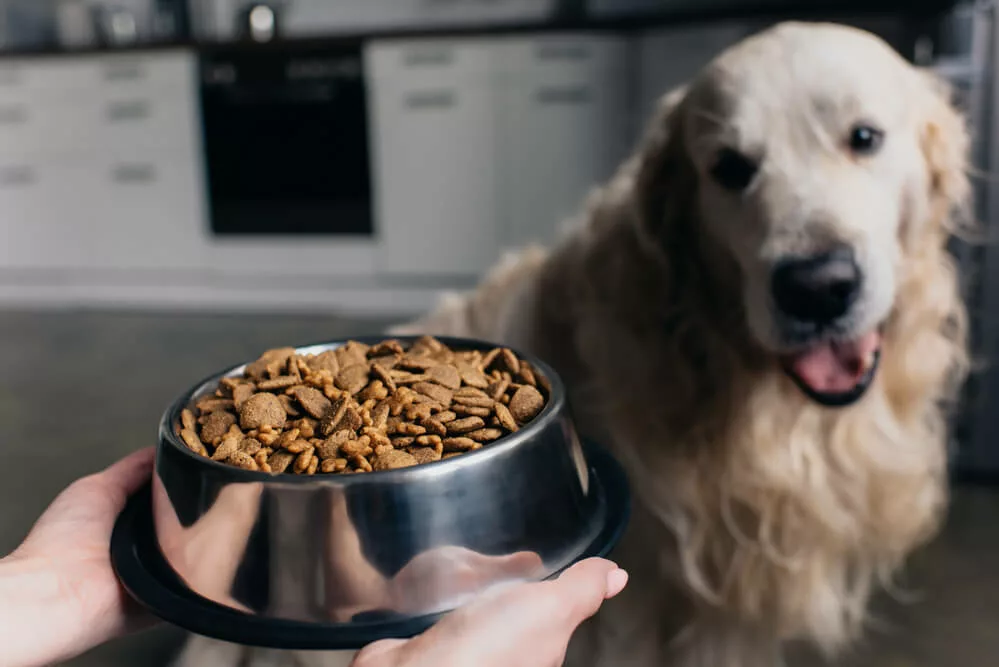As a responsible dog owner, you want to ensure that your furry friend is healthy and happy. One of the most common health issues among dogs is digestive problems, such as sensitive stomachs. This means that your dog’s digestive system is more prone to irritation, which can lead to a myriad of health problems.
Understanding the Root of the Problem
Dogs that have tummy issues can experience a variety of digestive issues, including gas, bloating, vomiting, and loose stools. Factors that contribute to sensitive stomachs include environmental stresses, certain foods, and changes in the dog’s routine or diet. Many dogs also have underlying digestive health issues, such as food allergies, inflammatory bowel disease, or gastrointestinal infections, which can cause them to have sensitive stomachs.
The Consequences of Not Addressing Sensitive Stomachs
Ignoring sensitive stomachs can have serious health consequences for your dog. If left untreated, it can lead to malnutrition, dehydration, and further digestive issues. Dogs that have food intolerance may also experience vomiting or loose stools more frequently, which can lead to electrolyte imbalances and other health complications.
The Benefits of Sensitive Stomach Grain-Free Nourishment
Dogs that have sensitive tummies require special food that is formulated with high-quality ingredients that are easy to digest and gentle on the digestive system. This type of food typically has a few-ingredient list and is free from common allergens, like wheat, soy, and dairy. Sensitive stomach dog food also has a low-fat content and high digestibility, which helps support healthy weight management and reduces the risk of digestive complications.
Choosing the Right Food for Dogs That Have Sensitive Stomachs
Choosing the right food for a dog that has a sensitive stomach can be challenging, but there are some key factors to consider. First and foremost, talk to your vet to identify any underlying health concerns or allergies that may be contributing to your dog’s sensitive stomach. Next, look for dog nourishment brands that are specifically formulated for dogs that have sensitive stomachs. They should be made with high-quality proteins, natural prebiotics, and a limited number of ingredients. Finally, transition your dog gradually to its new food to prevent digestive upset.
What Should I Look For In Dog Food For Sensitive Stomachs?

Your dog is a beloved member of your family, and it can be distressing to see them that have digestive issues, particularly when they have a sensitive stomach. Choosing the right dog nourishment for dogs that have sensitive stomachs is crucial in maintaining their health and ensuring they don’t experience any digestive discomfort.
Understanding the Reasons behind Sensitive Stomachs
Canine nutrition intolerance occurs when a dog’s digestive system is easily irritated by certain ingredients, toxins, or environmental factors. Factors that contribute to sensitive stomachs include stress, allergens, and dietary changes. Feeding your dog high-quality food formulated for sensitive stomachs can improve their digestive system and alleviate their symptoms.
The Importance of High-Quality Protein
A dog that has stomach issues should be given highly digestible protein such as chicken, fish, turkey, or lamb. Easily digestible proteins would encourage a more comfortable and faster digestion process, reducing the risk of further digestive issues. Protein should also be free of additives and preservatives, which can irritate your dog’s digestive system.
Why Limited Ingredient Dog Food is the Best Choice
Limited-ingredient canine nutrition is a great choice for dogs that have sensitive stomachs. This type of food is made with a few select, high-quality ingredients, free from common allergens like wheat, corn, soy, and dairy. Unlike traditional dog nourishment, limited-ingredient dog nourishment contains fewer ingredients that can irritate a dog’s digestive system. This can help reduce symptoms such as loose stools, vomiting, and bloating.
The Role of Omega-6 Fatty Acids in Promoting Healthy Skin and Coat
Omega-6 fatty acids promote healthy skin and coat, protecting your dog from allergies and other related skin conditions. The concentration of Omega-6 in dog nourishment designed for dogs that have sensitive stomachs is higher than in regular dog nourishment. This is because sensitive stomachs can result in nutrient malabsorption, including fatty acids.
Is Grain-Free Good For Dogs With Sensitive Stomachs?

Grain-free diets have become increasingly popular among dog owners in recent years because they believe that dogs may be intolerant to grains. While this is debatable, it’s important to understand that a grain-free diet is not automatically the best option for dogs that have sensitive stomachs.
One thing to keep in mind is that grains are not harmful to dogs. They are an excellent source of carbohydrates, which provide energy to dogs. However, dogs do have varying nutritional requirements, and some may have a sensitivity or intolerance to grains, which can cause digestive problems.
Nutritional Value of Grain-Free Pet Food
Grain-free pet food commonly contains a higher amount of protein and fewer carbohydrates than traditional foods. This is because, in the absence of grains, manufacturers often rely on alternative proteins such as meat, fish, or legumes. In addition, some grain-free pet foods may contain added fiber or vegetables as an alternative source of carbohydrates.
While this may sound great, it’s important to understand that every dog has unique nutritional requirements. Some dogs may do great on a grain-free diet, while others may have trouble digesting the high protein content. Therefore, it’s important to consult with a vet before feeding your dog any new type of food.
Impact of Grain-Free Diet on Sensitive Stomachs
Grain-free diets can be beneficial for some dogs that have sensitive stomachs, especially those with a grain allergy or intolerance. However, some dogs may also have sensitivities or intolerances to alternative proteins found in grain-free diets, such as chicken, beef, or legumes.
Therefore, it’s important to pay attention to your dog’s response to the new diet and not assume that a grain-free diet will solve all digestive problems.
Alternative Food Options for Dogs That Have Sensitive Stomachs
One option for dogs that have sensitive stomachs is to switch to a minimal-ingredient diet. These diets typically contain a single amino acid source and a single carbohydrate source, which can make it easier to identify potential food sensitivities.
Another alternative is to switch to a hydrolyzed protein diet, which breaks down the protein into smaller parts, making it less likely to cause an allergic reaction.
For dogs who do not have a sensitivity, traditional dog nourishments containing high-quality grains will not cause digestive problems, and can also provide essential nutrients for growth and maintenance.

Suggested Routine Course of Action
If you are considering changing your dog’s diet to a grain-free diet or any other new nourishment type, it is important to do so gradually. This will help to avoid digestive problems that can arise from an abrupt diet change.
Start by mixing a small amount of the new nourishment with the current food and gradually increase the amount of the new nourishment until it fully replaces the old food.
Dog Breeds and Sizes that May Benefit from a Grain-Free Diet
While every dog has different nutritional requirements, some breeds may be more prone to grain sensitivities than others. Breeds such as Boxers, Bulldogs, and Cocker Spaniels may be more prone to digestive problems and may benefit from a grain-free or few-ingredient diet.
In addition, some small dog breeds may benefit from a grain-free diet, as their small stomachs may have a harder time digesting grains. Consulting with a vet is essential to determine the best diet for your dog’s individual needs, and to ensure that they are receiving the essential nutrients they need for a healthy life.
What Are The Best Grain-Free Dog Foods For Dogs With Sensitive Stomachs

Grain-free diets can be beneficial for dogs that have sensitive stomachs, especially if they have a grain allergy or intolerance. These diets often contain a higher amount of protein and fewer carbohydrates. More importantly, they eliminate potentially harmful ingredients, such as wheat, corn, and soy.
When choosing the right grain-free food for your dog, it is important to avoid foods that contain artificial ingredients or fillers, as they can cause digestive problems and allergic reactions. Look for canine nutrition that has natural ingredients, balanced nutrition, and is free of common grains and allergens.
Here are three specific grain-free food recommendations that can benefit dogs that have sensitive stomachs:
This food contains real turkey as the first ingredient and primary amino acid source, making it suitable for dogs that have sensitive stomachs. Additionally, it is free from common allergens, such as corn and soy. It includes potatoes, which are an excellent source of carbohydrates and promote digestive health. This canine nutrition is also rich in antioxidants, vitamins, and minerals to promote overall health.
This food is specially formulated to meet the dietary needs of dogs with sensitivities to common amino acids and grains. Chicken is the primary source of protein, and it contains sweet potatoes, peas, and whole foods like garbanzo beans and butternut squash. It is also free from artificial preservatives, flavors, and colors, making it a healthy option for dogs that have sensitive stomachs and are prone to digestive problems.
This food contains high-quality protein sources such as deboned chicken and chicken meal. Additionally, it is free from artificial preservatives and fillers that can cause allergies and digestive issues. This food is also rich in Omega-6 and Omega-3 fatty acids, which help support healthy skin. It includes vegetables like carrots and sweet potatoes, providing essential nutrients and promoting digestive health.
What Are The Best Dog Foods For Sensitive Stomachs?
Blue Buffalo Basics Limited Ingredient Diet
The Blue Buffalo Basics Limited Ingredient Diet is the perfect food for dogs that have sensitive stomachs. It’s one of the best food options on the market that contain a limited number of constituents, one protein source and is grain-free. It is also loaded with healthy nutritional supplements like vitamins, minerals, and probiotics for optimal health. However, it is a little expensive compared to other canine nutrition brands.
Purina Pro Plan Sensitive Skin and Stomach Formula
The Purina Pro Plan Sensitive Skin and Stomach Formula offer unique nutritional benefits to your furry friend. It is designed to take care of your dog’s skin, coat, and digestive system while being gentle on its stomach. This food is easy to digest, free of common allergens, and predominantly a single amino acid source. However, it’s important to note that the price point can be higher than other options on the market.
Hill’s Science Diet Sensitive Stomach and Skin Adult Dog Food
This is another great food that helps to maintain digestive health and improve skin and coat. It contains a combination of prebiotics and fiber for optimal digestive health. Hill’s Science Diet Sensitive Stomach and Skin Adult Dog Food are also rich in Omega-6 oils to support healthy coats and skin. However, some of the ingredients may not trigger digestive relief in all dogs.

How To Transition Your Dog To A New Grain-Free Dog Food?
The Importance of Transitioning Dog Food Properly
A sudden switch to new canine nutrition can easily upset the stomach of a sensitive dog. A sudden change might cause vomiting, diarrhea, lethargy, and other digestive upsets, which can impact your furry friend’s gastrointestinal condition. To avoid these symptoms, it is essential to transition gradually and properly. It’s important to make a change in the food for your furry friend slowly.
Dos and Don’ts of Switching Canine Nutrition
The following are essential tips to remember when switching your dog’s food:
Do’s:
- Consult your veterinarian before making any changes
- Incorporate the new nourishment slowly by mixing a small amount of the new nourishment with the old food to avoid digestive complications
- Watch your dog closely for any specific negative reactions to the new nourishment
- Get recommendations from experts in the pet food industry
- Research the nutritional value and ingredient lists of various dog food brands to choose quality food
Don’ts:
- Don’t change the food abruptly, even if you think the new nourishment is better
- Don’t forget that a sudden change in diet can disrupt your dog’s digestive system, leading to unpleasant side effects.
The Significance of a Gradual Transition
A gradual transition is a key to success when transitioning your furry friend to new canine nutrition. Introduce the new nourishment by mixing small amounts into their current food for over 7-10 days. Start on a 75/25 ratio of the old and new nourishment, gradually increasing the new nourishment content in incremental stages until your furry friend is entirely on the new food.
How to Use an Elimination Diet
The most effective way to identify food sensitivities is by conducting an elimination trial. This is done by removing all food ingredients from the dog’s diet and introducing gradually some new basic ingredients over a period to identify the trigger. The elimination process can take several months to accurately identify the potential allergen. Some of the most common ingredients that cause sensitivity in dogs include dairy, wheat, soy, and chicken.
Recommended Dog Foods
When looking for new dog food to try for your fur friend, choose human-grade organic, which eliminates some of the fillers that can cause sensitivity in sensitive stomach dogs. Two recommended brands include Nulo Adult Grain-Free Dry Dog Food and Ollie Fresh Dog Food. Both brands are rich in nutrients, amino acid, and other helpful components for dogs with sensitive stomachs.

Can Puppies Benefit from Dog Food for Sensitive Stomachs?
Puppies are adorable, and taking care of them is an exciting experience. One of the most important aspects of caring for a new puppy is ensuring they get the right nutrition. Feeding your puppy with high-quality nutrition from an early age is essential for their growth and development. However, with sensitive stomachs being a common issue among puppies, it is important to choose the right canine nutrition for their digestive health and overall well-being.
Different Types of Sensitive Stomachs in Puppies
Sensitive stomachs can vary from one puppy to another. Some puppies may have digestive issues such as vomiting or diarrhea, while others may experience gas and regular flatulence. Identifying the cause of digestive issues early on will enable you to choose the right canine nutrition for your puppy. It is important to avoid foods that are high in fat, artificial additives, or unfamiliar ingredients that can trigger issues.
Best Dry Dog Food Options for Puppies with Sensitive Stomachs
Hill’s Science Diet Puppy Sensitive Stomach & Skin Chicken Meal & Barley Recipe
This dry dog food option is specially formulated to promote puppies’ digestive health. It contains high-quality ingredients such as fresh chicken to provide sufficient protein while also being gentle on your puppy’s stomach. This dog food is also rich in Omega-6 fatty acids, which improve puppies’ skin health.
Royal Canin Gastrointestinal Puppy Dry Dog Food
The Royal Canin Gastrointestinal Puppy Dry Dog Food provides easy-to-digest proteins and prebiotics. It helps to enhance healthy digestion and reduce inflammatory bowel disease symptoms. However, this food option is relatively expensive compared to other brands.
Best Wet Food Options for Puppies with Sensitive Stomachs
Purina Pro Plan Focus Puppy Sensitive Skin & Stomach Salmon & Rice Entree
This wet dog food option contains easily digestible ingredients like rice and salmon. It does not contain any wheat, soy, or artificial flavors and preservatives, making it suitable for sensitive puppies. This food option is also rich in Omega-3 fatty acids, which promote healthy coats and skin.
Blue Buffalo Blue’s Stew Puppy Chicken Stew Wet Dog Food
This wet food option is made with high-quality protein-rich chicken, vegetables, and brown rice, ensuring your puppy has a balanced diet while avoiding ingredients known to trigger sensitivity. The food is also rich in vitamin E, which is essential for puppies’ immune system development.

What Are the Best Dog Foods for Senior Dogs with Sensitive Stomachs?
As our furry friends grow older, their bodies undergo numerous changes, and their dietary needs may change too. Elderly dogs often experience digestive problems, including upset stomachs, which can cause discomfort, slow down their metabolism, and even cause weight loss. Finding the right type of canine nutrition for an older dog with a sensitive stomach is vital to ensure its dietary needs are met and to prevent digestive issues.
Why Mature Dogs That Have Sensitive Stomachs Need Special Food
Mature dogs that have sensitive stomachs experience a range of digestive problems such as vomiting, diarrhea, flatulence, and weight loss. These symptoms can cause discomfort for the dog, potentially lead to malnutrition, and negatively impact their overall health. Providing special food to these dogs helps to reduce symptoms and provides the necessary nutrients to support their well-being.
Top Three Best Dog Foods for Senior Dogs with Sensitive Stomachs
Nutro Limited Ingredient Diet Senior Dog Food is perfect for old dogs suffering from sensitive stomachs. Its list of ingredients is limited and offers high-quality amino acid and a blend of natural fibers along with essential vitamins and minerals. This food is free from common allergens such as corn, wheat, and soy, making it easy to digest, and best of all, it is budget-friendly.
Merrick Limited Ingredient Diet
Merrick Limited Ingredient Diet Senior Dog Food comes with a grain-free recipe, which is perfect for older dogs with food sensitivities. It contains whole foods such as sweet potatoes, chicken, and sweet peas, which provide a good source of amino acids, energy, and fiber. Moreover, this canine nutrition contains antioxidants for immune system support and joint supplements for joint health.
Wellness Simple Limited Ingredient Diet
Wellness Simple Limited Ingredient Diet Senior Dog Food is a great choice for old dogs suffering from sensitive stomachs. It contains easily digestible proteins like salmon and chicken, whole grains, and vegetables that can help ease digestion. It’s also packed with beneficial supplements such as glucosamine and chondroitin that help support healthy joints in aging dogs.
Why Are These Dog Foods the Best for Older Dogs with Sensitive Stomachs?
These foods are considered some of the best options on the market for older dogs with sensitive stomachs because of their high-quality ingredients, abundant nutritional value, ease of digestion, and because they’re designed for older dogs with specific dietary requirements. This canine nutrition contains essential nutrients which help boost the immune system, maintain muscle mass, and improve joint health.






